
A hamburger, or simply a burger, is a dish consisting of fillings—usually a patty of ground meat, typically beef—placed inside a sliced bun or bread roll. The patties are often served with cheese, lettuce, tomato, onion, pickles, bacon, or chilis with condiments such as ketchup, mustard, mayonnaise, relish or a "special sauce", often a variation of Thousand Island dressing, and are frequently placed on sesame seed buns. A hamburger patty topped with cheese is called a cheeseburger. Under some definitions, and in some cultures, a burger is considered a sandwich.
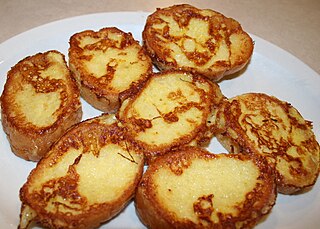
French toast is a dish of sliced bread soaked in beaten eggs and often milk or cream, then pan-fried. Alternative names and variants include eggy bread, Bombay toast, gypsy toast, and poor knights (of Windsor).
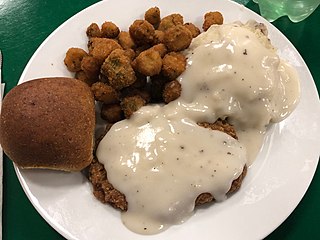
Chicken-fried steak, also known as country-fried steak, is an American Southern breaded cutlet dish consisting of a piece of beefsteak coated with seasoned flour and either deep-fried or pan-fried. It is associated with the Southern cuisine of the United States. It is breaded and fried with a technique similar to the more common fried chicken, hence "chicken-fried". When deep-fried, it is usually referred to as "chicken-fried steak". Pan-fried versions are typically referred to as "country-fried steak".

Welsh rarebit or Welsh rabbit is a dish of hot cheese sauce, often including ale, mustard, or Worcestershire sauce, served on toasted bread. The origins of the name are unknown, though the earliest recorded use is 1725 as "Welsh rabbit" ; the earliest documented use of "Welsh rarebit" is in 1781. Variants include English rabbit, Scotch rabbit, buck rabbit, golden buck, and blushing bunny.

An open sandwich, also known as an open-face/open-faced sandwich, bread baser, bread platter or tartine, consists of a slice of bread or toast with one or more food items on top. It has half the number of slices of bread compared to a typical closed sandwich.

Scrambled eggs is a dish made from eggs, where the whites and yolks have been stirred, whipped, or beaten together, then heated so that the proteins denature and coagulate, and they form into "curds".
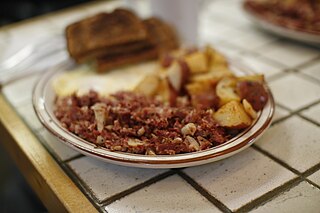
Hash is a dish consisting of chopped meat, potatoes, and fried onions. The name is allegedly derived from French: hacher, meaning 'to chop'. It originated as a way to use up leftovers. In the U.S. by the 1860s, a cheap restaurant was called a "hash house" or "hashery."

Chateaubriand is a dish that traditionally consists of a large front cut fillet of tenderloin grilled between two lesser pieces of meat that are discarded after cooking. While the term originally referred to the preparation of the dish, Auguste Escoffier named the specific front cut of the tenderloin the Chateaubriand.

Steak tartare or tartar steak is a French dish of raw ground (minced) beef. It is usually served with onions, capers, parsley or chive, salt, pepper, Worcestershire sauce, and other seasonings, often presented separately, to be added to taste. It is commonly served topped with a raw egg yolk. It is similar to the Levantine kibbeh nayyeh, the Turkish çiğ köfte, the German Mett and the Korean yukhoe.

Smørrebrød, smørbrød "butter bread" (Norwegian), or smörgås " butter goose" (Swedish), is a traditional open-faced sandwich in the cuisines of Denmark, Norway and Sweden that usually consists of a piece of buttered rye bread, topped with commercial or homemade cold cuts, pieces of meat or fish, cheese or spreads, and garnishes.

An egg sandwich is a sandwich with some kind of cooked egg filling. Fried eggs, scrambled eggs, omelette, sliced boiled eggs and egg salad are popular options. In the last case, it may be called an egg salad sandwich.

Beef tongue is a cut of beef made of the tongue of a cow. It can be boiled, pickled, roasted or braised in sauce. It is found in many national cuisines, and is used for taco fillings in Mexico and for open-faced sandwiches in the United Kingdom. In France and Belgium it is served with Madeira sauce, while chrain is the preferred accompaniment in Ashkenazi and Eastern European cuisines. Germans make white roux with vinegar and capers, or horseradish cream, which is also popular in Polish cuisine.
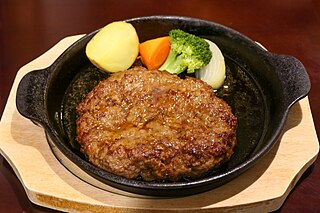
Hamburg steak is a patty of ground beef. Made popular worldwide by migrating Germans, it became a mainstream dish around the start of the 19th century. It is related to Salisbury steaks, which also use ground beef. It is considered the origin of the hamburger, when, in the early 20th century, vendors began selling the Hamburg steak as a sandwich between bread.
A collop is a slice of meat, according to one definition in the Oxford English Dictionary. In Elizabethan times, "collops" came to refer specifically to slices of bacon. Shrove Monday, also known as Collop Monday, was traditionally the last day to cook and eat meat before Ash Wednesday, which was a non-meat day in the pre-Lenten season also known as Shrovetide. A traditional breakfast dish was collops of bacon topped with a fried egg.
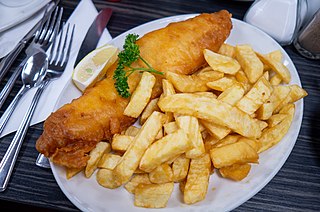
Bermudian cuisine blends British and Portuguese cuisine with preparations of local seafood species, particularly wahoo and rockfish. Traditional dishes include codfish and potatoes served either with an add-on of hard-boiled egg and butter or olive oil sauce with a banana or in the Portuguese style with tomato-onion sauce, peas and rice. Hoppin' John, pawpaw casserole and fish chowder are also specialties of Bermuda. As most ingredients used in Bermuda's cuisine are imported, local dishes are offered with a global blend, with fish as the major ingredient, in any food eaten at any time.

Creamed eggs on toast is an American breakfast dish. It consists of toast or biscuits covered in a gravy made from béchamel sauce and chopped hard-boiled eggs. The gravy is often flavored with various seasonings, such as black pepper, garlic powder, celery salt, Worcestershire sauce, sherry, chopped parsley and/or chopped chives. The Joy of Cooking recommends making the bechamel with 1⁄2 cream and 1⁄2 chicken stock and adding capers or chopped pickle. As with many other dishes covered in light-colored sauce, a sprinkle of paprika or cayenne is often added as decoration.
Breakfast, the first meal of the day eaten after waking from the night's sleep, varies in composition and tradition across the world.















